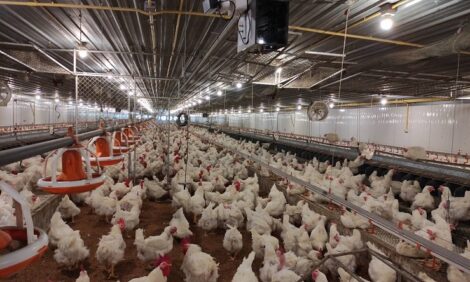



Legal Costs Mount in Battle against Poultry Plant
NORTH CAROLINA, US - Legal battles to prevent a new poultry plant in Nash County has so far cost taxpayers more than $1 million.Several court cases linked to a controversial Sanderson Farms poultry processing plant site have placed substantial dents in the wallets of Nash County and the city of Wilson, reports Rocky Mountain Telegram.
More than $1.1 million in taxpayers' money has been spent on litigation and environmental studies between the two local government entities over two lawsuits. Sanderson Farms, based in Laurel, Mississippi, wants to build a second North Carolina poultry processing plant – a 180,000-square-foot facility proposed for a nearly 150-acre tract at the intersection of Interstate 95 and N.C. 97.
Nash County officials said the corridor was re-zoned for industrial use to serve as an area for any large industry that wants to relocate to the region, pointing out that the land has prime access to utilities and major highways. Wilson officials – along with 34 landowners from Nash and Wilson counties – have vowed to keep the company away from the corridor, citing possible environmental damage to the protected watershed.
A Pitt County judge recently dismissed two lawsuits designed to prevent Sanderson from building. Landowners in the area and the city of Wilson have not said whether they plan to appeal.
Wilson attorney, Jim Cauley, said city officials have turned to specialised legal counsel and technical experts to advise the Wilson City Council on potential environmental impacts and to handle related court proceedings. To date, Wilson has spent $587,668 on this effort, he said.
That total includes approximately $314,095 to challenge the initial and the second re-zonings. Those costs also include court reporters' charges in the re-zoning cases.
Mr Cauley said Wilson officials have not paid any of the attorney fees incurred by the landowners. The rest of the city's costs, $273,573, have been spent in connection with the environmental issues, rather than the zoning issues, he said.
In a prepared statement, he said: "Since November 2010, the city of Wilson has been working to defend its priceless water supply from adverse impacts anticipated from chicken operations."
Regarding the money spent on litigation, Wilson City Manager, Grant Goings, said in a prepared statement: "Some things are always worth fighting for, regardless of the cost. (Wilson) City Council has clearly stated that our water supply is one of them."
The Wilson City Council last year voted to spend as much as $1 million to pay for litigation against the proposed plant. Wilson's litigation costs do not include amounts paid by the 34 landowners who also brought claims against Nash County.
Mr Goings said in a prepared statement: "Wilson would like to see this issue resolved and initiated compromise discussions back in February of this year. We remain open to compromise that protects our environment."
Nash County has spent approximately $459,406 on legal fees, trying to ward off opposition from Wilson over allegations of contract zoning. Nash financial officials said $475,000 originally was budgeted to cover the costs for litigation.
There are additional costs – $23,597 for engineering fees associated with the project's development costs; $88,180 for collaboration with the Raleigh-based engineering firm Wooten Company on the project’s draft environmental impact statement; and $33,121 for grant application and other administrative costs. The grand total is $144,900.
In a recent Rocky Mountain Telegram interview, Nash County Manager, Bob Murphy said it is a shame that Wilson and Nash County taxpayers have to spend those amounts of money for attorneys.
Mr Murphy commented: "The way we look at it was, we really didn't have a choice in the matter. We were sued by the city of Wilson and other plaintiffs. What they challenged was our right to zone property.
"What we do know is that we have 150 acres on Highway 97 – a highway with significant capacity, located within a mile of an interchange on a major interstate that is prime industrial property. We think we are entirely in our rights to rezone that property for industry. We're not going to allow the city of Wilson to control our destiny in a large area of Nash County. We have to vigorously defend our right to develop in Nash County."
Further Reading
| - | You can view the full newspaper article by clicking here. |








